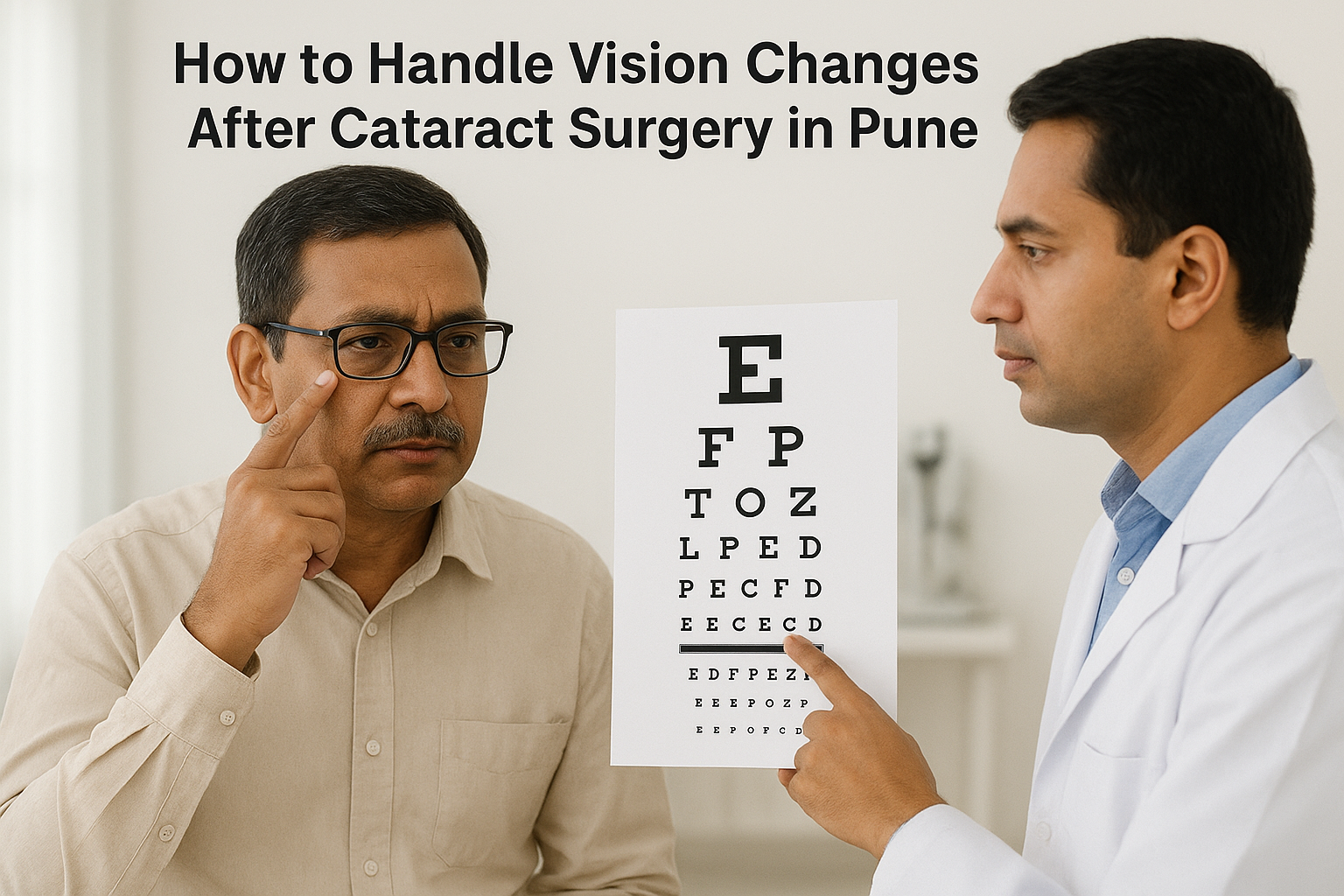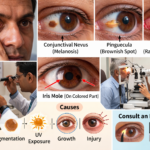Cataract surgery is a life-changing procedure that can restore clear vision and help you regain your independence. For many patients, it’s the first step toward seeing vibrant colors and crisp details after years of clouded eyesight. However, the period following surgery may bring temporary vision changes as your eyes adjust to their new lenses. Understanding what to expect can help ease any concerns during this transition.
Whether you are recovering at home or visiting Axis Eye Clinic, one of the Best Eye Clinic in Pune, being informed about potential post-surgery changes will empower you to manage your recovery confidently. Let’s explore common scenarios after cataract surgery and how to handle them effectively, ensuring a smooth and stress-free healing process.
• Blurred or cloudy vision: Your eyes are adjusting to the new lenses, so temporary blurriness is normal.
• Light sensitivity: Increased sensitivity to sunlight or bright lights is common during the initial healing phase.
• Enhanced color perception: Colors may appear more vibrant, which can be a pleasant change, though your brain needs time to adjust.
• Glare or halos at night: Driving at night might feel challenging due to glare around lights. Adjusting lighting and taking precautions is important.
• Fluctuating vision: Temporary variations in eyesight are normal. Regular check-ups help ensure these changes are part of the healing process.
1. Follow Post-Surgery Instructions
Adhering to your eye specialist’s instructions is crucial for optimal recovery. Dr. Ramesh Murthy at Axis Eye Clinic provides personalized guidelines to ensure the best outcomes.
• Attend all follow-up appointments to monitor healing progress.
• Avoid heavy lifting or strenuous activities initially to prevent eye strain.
• Use all prescribed eye drops consistently to reduce inflammation and prevent infection.
Following these steps diligently can significantly improve your visual recovery.
2. Don’t Panic – Be Patient
Vision fluctuations are common after surgery. Temporary changes in eyesight are part of the adjustment process.
• Take deep breaths and give your eyes time to heal.
• Focus on gradual improvements rather than expecting immediate perfection.
• Engage in relaxing activities like reading or listening to music to reduce stress and anxiety during recovery.
Patience is key as your eyes adapt to their new lenses.
3. Use Prescribed Eye Drops and Medications
Post-surgery medications are essential to manage inflammation and prevent infection.
• Apply eye drops consistently at the recommended times.
• Wash your hands before applying drops to avoid introducing bacteria.
• If you experience discomfort or side effects, consult Dr. Ramesh Murthy for adjustments.
Consistent use of prescribed medications supports faster healing and clearer vision.
4. Wear Protective Eyewear
Protective eyewear helps shield your eyes during the sensitive post-surgery phase.
• Use sunglasses with UV protection outdoors to reduce discomfort and prevent damage.
• Indoors, wear safety glasses if performing activities that could risk eye injury.
• Blue-light-blocking glasses can minimize strain from screens as your vision adjusts.
Prioritizing protective eyewear promotes healing and long-term eye health.
• Sudden vision loss or severe changes in eyesight
• Persistent pain unrelieved by medications
• Increased redness or unusual discharge from the eyes
• Flashes of light or new floaters
If any of these symptoms occur, don’t wait—search for an eye hospital near me to find prompt, trusted care. Consulting the Best Eye Specialist in Pune ensures timely intervention and prevents complications. For prompt care, you can also look for best cataract hospital near me to reach trusted professionals like Dr. Ramesh Murthy at Axis Eye Clinic.
• Eat a diet rich in antioxidants (leafy greens, carrots, fish) to support eye health.
• Stay hydrated to maintain optimal eye moisture.
• Engage in light exercise to improve blood circulation without straining the eyes.
• Avoid smoking and excessive alcohol, which can delay healing.
• Follow the 20-20-20 rule during screen time to prevent digital eye strain.
• Take medications as prescribed
• Wear protective eyewear
• Monitor symptoms and seek help if needed
Trust Dr. Ramesh Murthy, one of the Best Cataract Surgeon in Pune, at Axis Eye Clinic, to guide you through recovery. With proper care and healthy lifestyle changes, you can look forward to enjoying a world of clearer vision.
Whether you are recovering at home or visiting Axis Eye Clinic, one of the Best Eye Clinic in Pune, being informed about potential post-surgery changes will empower you to manage your recovery confidently. Let’s explore common scenarios after cataract surgery and how to handle them effectively, ensuring a smooth and stress-free healing process.
Common Vision Changes After Cataract Surgery
Many patients notice changes in vision after cataract surgery. Some common experiences include:• Blurred or cloudy vision: Your eyes are adjusting to the new lenses, so temporary blurriness is normal.
• Light sensitivity: Increased sensitivity to sunlight or bright lights is common during the initial healing phase.
• Enhanced color perception: Colors may appear more vibrant, which can be a pleasant change, though your brain needs time to adjust.
• Glare or halos at night: Driving at night might feel challenging due to glare around lights. Adjusting lighting and taking precautions is important.
• Fluctuating vision: Temporary variations in eyesight are normal. Regular check-ups help ensure these changes are part of the healing process.
Tips for Handling Vision Changes
To manage vision changes effectively after cataract surgery, follow these guidelines:1. Follow Post-Surgery Instructions
Adhering to your eye specialist’s instructions is crucial for optimal recovery. Dr. Ramesh Murthy at Axis Eye Clinic provides personalized guidelines to ensure the best outcomes.
• Attend all follow-up appointments to monitor healing progress.
• Avoid heavy lifting or strenuous activities initially to prevent eye strain.
• Use all prescribed eye drops consistently to reduce inflammation and prevent infection.
Following these steps diligently can significantly improve your visual recovery.
2. Don’t Panic – Be Patient
Vision fluctuations are common after surgery. Temporary changes in eyesight are part of the adjustment process.
• Take deep breaths and give your eyes time to heal.
• Focus on gradual improvements rather than expecting immediate perfection.
• Engage in relaxing activities like reading or listening to music to reduce stress and anxiety during recovery.
Patience is key as your eyes adapt to their new lenses.
3. Use Prescribed Eye Drops and Medications
Post-surgery medications are essential to manage inflammation and prevent infection.
• Apply eye drops consistently at the recommended times.
• Wash your hands before applying drops to avoid introducing bacteria.
• If you experience discomfort or side effects, consult Dr. Ramesh Murthy for adjustments.
Consistent use of prescribed medications supports faster healing and clearer vision.
4. Wear Protective Eyewear
Protective eyewear helps shield your eyes during the sensitive post-surgery phase.
• Use sunglasses with UV protection outdoors to reduce discomfort and prevent damage.
• Indoors, wear safety glasses if performing activities that could risk eye injury.
• Blue-light-blocking glasses can minimize strain from screens as your vision adjusts.
Prioritizing protective eyewear promotes healing and long-term eye health.
When to Seek Medical Attention
Immediate consultation is necessary if you notice:• Sudden vision loss or severe changes in eyesight
• Persistent pain unrelieved by medications
• Increased redness or unusual discharge from the eyes
• Flashes of light or new floaters
If any of these symptoms occur, don’t wait—search for an eye hospital near me to find prompt, trusted care. Consulting the Best Eye Specialist in Pune ensures timely intervention and prevents complications. For prompt care, you can also look for best cataract hospital near me to reach trusted professionals like Dr. Ramesh Murthy at Axis Eye Clinic.
Lifestyle Changes to Improve Post-Cataract Surgery Vision
Incorporating healthy habits can enhance recovery and vision clarity:• Eat a diet rich in antioxidants (leafy greens, carrots, fish) to support eye health.
• Stay hydrated to maintain optimal eye moisture.
• Engage in light exercise to improve blood circulation without straining the eyes.
• Avoid smoking and excessive alcohol, which can delay healing.
• Follow the 20-20-20 rule during screen time to prevent digital eye strain.
Embracing Life with Improved Vision
Cataract surgery can transform your life by restoring clear and vibrant vision. Temporary vision changes are a normal part of recovery, but following your eye specialist’s advice and being patient will make the process smoother.• Take medications as prescribed
• Wear protective eyewear
• Monitor symptoms and seek help if needed
Trust Dr. Ramesh Murthy, one of the Best Cataract Surgeon in Pune, at Axis Eye Clinic, to guide you through recovery. With proper care and healthy lifestyle changes, you can look forward to enjoying a world of clearer vision.






